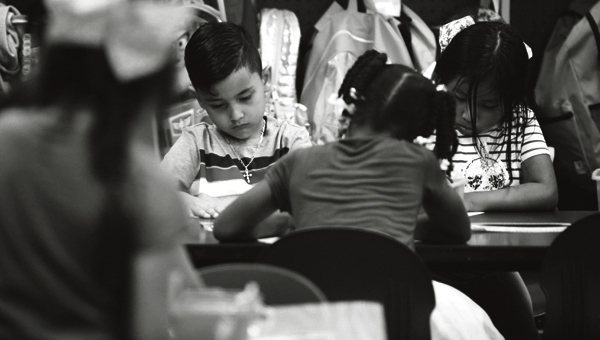
28 Sep Catching up: Shepherd focuses on helping students recover learning lost in the pandemic. Here’s how you can help.
The past 19 months have been the most challenging in the history of American education.
Schools shut down suddenly as the COVID-19 pandemic first surged in March 2020. Students, parents and educators had to shift quickly to online learning, even in areas like the near east side of Indianapolis where internet access is spotty. And once schools reopened, the return to in-person learning was far from normal for students and teachers, who had to adjust to classroom routines and safety protocols.
It’s not all surprising then that children’s grasp of reading, math and other core academic skills has suffered significantly during the pandemic.
The global consulting firm McKinsey found that students on average finished the 2020-21 school year five months behind in math and four months in reading compared to the level they likely would have achieved if not for the pandemic. Students of color were on average six months behind in learning.
Without strategic and sustained intervention, the learning loss the pandemic has wrought will have devastating, lifelong consequences for students in Indianapolis and across the nation.
“Kids growing up in poverty already face multiple challenges in regard to academic achievement, and learning loss is often an area where we see that as well, especially in the summers,” Andrew Green, assistant executive director at Shepherd Community Center, said. “Add to that a pandemic, where we expected kids to continue learning when they were away from the rhythm and routines of school, and you can see why we are so concerned for our neighbors.”
In response, Shepherd has made significant investments in academic remediation. Specialists in reading and learning recovery have been hired. Teachers have been trained in the Orton-Gillingham Approach to reading, writing and spelling (designed specifically to help students who struggle with those essential skills). Shepherd has partnered with the Indianapolis Public Library to open a library at the community center to serve students and their families. Shepherd also has partnered with the University of Indianapolis and Purdue Northwest to train staff in accelerated learning recovery and high-dosage tutoring. And Shepherd worked with the Mind Trust and the United Way to bolster students’ learning this summer.
Green said Shepherd also plans to offer more opportunities for students to acquire STEM (science, technology, engineering and math) skills while in classrooms and outside of school.
Such efforts are a natural extension of Shepherd’s mission to “break the cycle of poverty.”
“Poverty impacts all areas of a child’s life, and so we design programs to address needs from a holistic standpoint,’ Green said. “We know how important education is in ‘breaking the cycle’ and how academic learning and success can help fuel the building of other assets as well. Our team is more resolved than ever to help support students in school and out of school.”
While the pandemic has affected students from every background, Shepherd’s neighbors have faced special challenges, including the many families for whom English is a second language.
“When the pandemic caused much of the learning to be done online at home, that meant, for students in families where English isn’t spoken at home, they didn’t have the same support available,” Green said. “And for some, the lack of internet access limited their ability to participate. We helped many of our families with internet access and provided computers for students to take home.”
Green noted that high-dosage tutoring is a major area of emphasis for Shepherd this school year. And serving as a tutor is a great way for volunteers to help kids recover the learning they’ve lost to the pandemic.
To volunteer as a tutor, go to https://shepherdcommunity.org/serve/volunteer/

